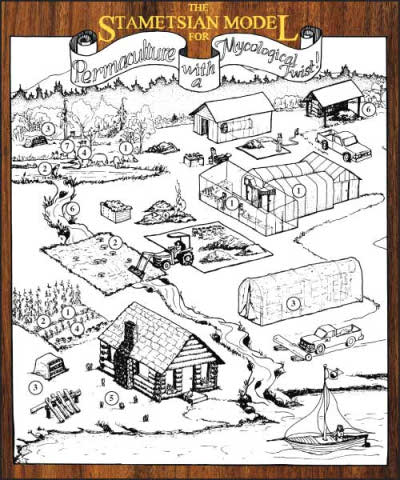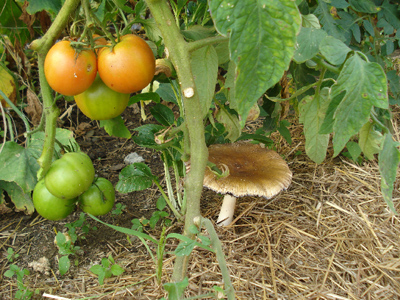
King Stropharia mushrooms in permaculture
 I checked out Growing Gourmet and Medicinal
Mushrooms
to learn a bit more about just what the title says, but I ended up
getting sucked in by the chapter on permaculture. (I know, what a
shock.) In the multi-use world of a working farm ecosystem, one
species stands out --- the King Stropharia (Stropharia rugosoannulata).
I checked out Growing Gourmet and Medicinal
Mushrooms
to learn a bit more about just what the title says, but I ended up
getting sucked in by the chapter on permaculture. (I know, what a
shock.) In the multi-use world of a working farm ecosystem, one
species stands out --- the King Stropharia (Stropharia rugosoannulata).
King Stropharia mushrooms are supposed to be both edible and tasty, but
their utility doesn't stop there. Paul Stamets reports food webs
that I wouldn't have believed coming from anyone else. I wasn't
so surprised to read that vegetables growing near the King Stropharia
grow better since I've read about how many
fungi team up with plant roots.
But I was shocked to hear that honey bees feed on the mushroom's
mycelium! Is this a possible method of providing our bees with
supplemental food other than sugar water?
Do bees feed on other species of fungi? I've personally seen our
workers harvesting something out of urine-soaked soil, and ever since
have been dubious of the the popular wisdom that bees just need
nectar/sugar and pollen.
As if that isn't enough of a reason to grow King Stropharia mushrooms,
Paul Stamets notes that the species is a potent bioremediator. He
sends runoff from his cow pasture through beds of wood chips full of
King Stropharia mycelium and sees clean water flowing out the other
end. Since Stamets has shown than the mushrooms can filter
bacteria and nitrogen out of contaminated water, I think that a King
Stropharia bed might be a perfect fit for our graywater leach field to
clean the water running out of our kitchen sink.
 If you're as sold on the idea of King
Stropharia mushrooms as I am,
you'll probably want to know how to grow them. Once you get a
start from one of the mushroom companies (such as Paul Stamets'
Fungi
Perfecti), this species is reported to be extremely easy to grow
outside. Just rake fresh wood chips to a depth of one foot, add
five to twenty pounds of sawdust spawn per hundred square feet, water
for four days with a sprinkler, and keep the bed moist thereafter by
watering for half an hour in the morning and evening. If you
start your King Stropharia bed in the early spring, as is recommended,
you should see fruits by late July and continue to eat this
permaculture king until autumn weather cools the ground. Be sure
to pick the mushrooms young and expand your bed once it's in full swing
using the stem
butt method!
If you're as sold on the idea of King
Stropharia mushrooms as I am,
you'll probably want to know how to grow them. Once you get a
start from one of the mushroom companies (such as Paul Stamets'
Fungi
Perfecti), this species is reported to be extremely easy to grow
outside. Just rake fresh wood chips to a depth of one foot, add
five to twenty pounds of sawdust spawn per hundred square feet, water
for four days with a sprinkler, and keep the bed moist thereafter by
watering for half an hour in the morning and evening. If you
start your King Stropharia bed in the early spring, as is recommended,
you should see fruits by late July and continue to eat this
permaculture king until autumn weather cools the ground. Be sure
to pick the mushrooms young and expand your bed once it's in full swing
using the stem
butt method!
This post is part of our Growing Gourmet Mushrooms lunchtime series.
Read all of the entries:
|
Want more in-depth information? Browse through our books.
Or explore more posts by date or by subject.
About us: Anna Hess and Mark Hamilton spent over a decade living self-sufficiently in the mountains of Virginia before moving north to start over from scratch in the foothills of Ohio. They've experimented with permaculture, no-till gardening, trailersteading, home-based microbusinesses and much more, writing about their adventures in both blogs and books.
Want to be notified when new comments are posted on this page? Click on the RSS button after you add a comment to subscribe to the comment feed, or simply check the box beside "email replies to me" while writing your comment.

"Paul Stamets reports food webs that I wouldn't have believed coming from anyone else."
Why does the guy who obviously wants to sell us stuff (from spawn to placemats), and also tries to patent things like growing mushrooms on cardboard, get more credibility than other folks?
Don't get me wrong, he's obviously made an immense contribution to mushroom cultivation in the English-speaking world. I have his books, I recommend his books. Nuff said.
But he also given us plenty of reasons to take his pronouncements with a grain of salt - including but not limited to the marketing and patents stuff mentioned above. Mycelium Running, in particular, is full of some pretty thin speculation, occasionally dressed up with graphs and terminology to make it look sciencey.
So: Grow King Stropharia. They are awesome, delicious, multifunctional. And let's think critically about the magical proporties that a salesman - any salesman - attributes to his products.
That breaks my heart that he's patenting growing mushrooms on cardboard. I guess the question is --- will he get mad at people like us who are growing mushrooms on cardboard without a license?
I have to admit I'm disturbed by the recent spate of patenting/trademarking everything. For example, I recently noticed that Quick Hoops is now a trademarked name, but when I contacted Eliot Coleman (and Johnny's) about the use of the term in my book, they were unconcerned. They said only that if I was using bent metal piping, I should add a "tm" after the name, but otherwise didn't need to worry.
Which leads me to my conclusion --- if Stamets is only patenting but not defending those patents in any way, he may just be protecting himself. After all, he has to make a living just like we do --- just because we sell chicken waterers shouldn't give my pasturing experiments any less merit. Similarly, just because Joel Salatin sells pastured meat and lots of books doesn't mean his experiments aren't fascinating and worth considering.
I read Mycelium Running with a grain of salt --- after all, Stamets goes into some extreme speculation in the first chapter about the thought processes of fungi. But for a long time, he was also the only person experimenting with growing mushrooms and then breaking it down into layman's terms. I think that's why we all think he's so awesome.
It boggles my mind that you could get a patent on growing mushrooms on cardboard. Even if mushrooms grow better on cardboard, that would be a discovery of a fact rather than an invention. Quite different things.
Then again, companies have patented (naturally occuring) genes and software (which is in essence mathematics).
Are the costs to society of patents still outweighed by the benefits to society? I don't think so. Quite an industry has sprung up around patent lawsuits. The cost of all that is borne by everyone who buys goods or services. The benefits (from patents that might or might not be valid, because it is costly to fight a patent battle) go to mostly to NPE's (Non Practicing Entities) and lawyers, neither of whom has done any of the inventing.